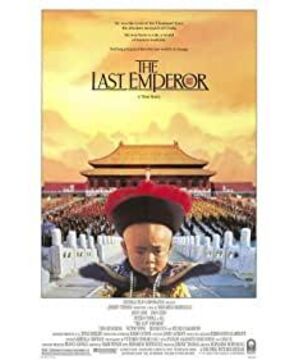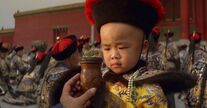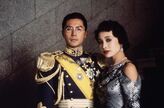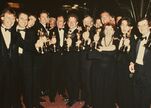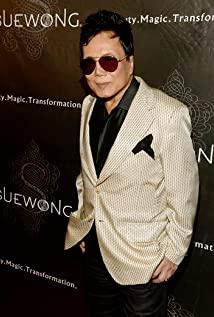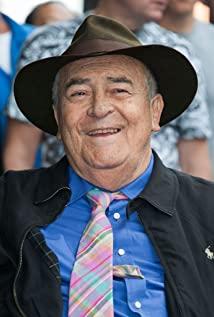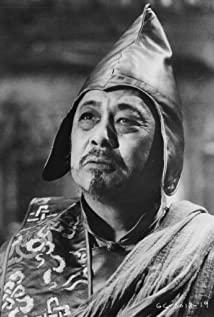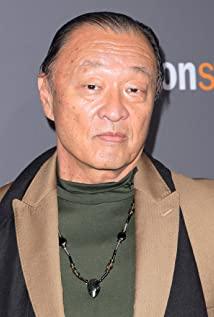First published on the public account "Detective"
Public ID: ttyingtan
Author: Miss Banana
Please indicate the source
He was only 3 years old when he was brought into the palace. The short stature did not fit into the huge carved dragon throne, like a fish thrown into the mouth of a whale. The huge jade seal that passed the throne was heavily covered on the yellow silk by the eunuch's voice.
Impatiently, he chased after the bright yellow curtain hanging at the door, and fell into the dazzling sunlight. The ministers bowed down. A life of ups and downs.
He was like a reckless baby who went to the kitchen to find food, but strayed into the center of power. He was left behind by the torrent of history that was rolling in. Distressed struggle, incompetent resistance, a game is empty. 32 years ago, it premiered in Taiwan and won the annual box office championship in Taiwan. 32 years later, the digitally restored version was re-released in Taiwan and topped the box office again.
I think, if it is re-screened in the mainland, there will also be countless people pouring into the theater——
"The Last Emperor"
TheLastEmperor 1987.10.23 Italy
In 100 years, there won't be a movie like this again. This sentence sounds a bit exaggerated at first, but it makes sense when you think about it. Because the people and things about this movie are legendary. In 1986, considering the protection of cultural relics, the Forbidden City announced a ban, prohibiting the film crew from entering the film. "The Last Emperor" became the first and last film to be filmed in the Forbidden City. Back then, when Queen Elizabeth II visited China, she was unable to visit the Forbidden City because of the filming.
Ying Ruocheng, who played the director in the film, was Ying Da's father, who was then the deputy minister of culture.
The scene of Puyi's ascension to the throne was almost always performed by the military. They were reluctant to shave their heads at first, saying it was for the sake of friendship between China and Italy, so they agreed to shave their heads.
In the past, Chen Kaige ran a trick in the film. The god of music, Ryuichi Sakamoto, was not only criticized by the director for his acting skills, but also drawn to compose music. In the end, I was hospitalized and wrote 44 pieces, only half of which were used. The professor was not tortured in vain, and the soundtrack made the movie.
At the Oscars in 1988. "The Last Emperor" won nine awards including Best Picture, Best Director and Best Original Score. Zun Long and Chen Chong became the first Chinese-American presenters in Oscar history.
Clint Eastwood said in his speech: "The Last Emperor has won nine awards, and this year is its year." Then he added, "The United States can no longer make such a film. movie."
>>>>Puyi - the cowardly rebel
Puyi had two "fathers". One is the father of the body, Emperor Guangxu; the other is the godfather of the spirit, Johnston. Emperor Guangxu - a character who did not appear, an absent father; but incarnated into power and system, shrouded Puyi like a ghost, merged into his blood and became a part of his body. He was imprisoned in the web of power, defenseless and with no escape.
Although it was a winter morning, the Kunning Palace was sullen. The dark red color blocks and the gray light stack up the atmosphere of depression and suffocation. The camera sweeps the faces of the old people, suggesting that the Qing Dynasty is about to die.
Cixi made Puyi the heir emperor and took her last breath. What was left to Puyi was a rotten system and moribund power. Overnight, even the biological father, Prince Chun, had to kowtow to Puyi. And a small child, who just wanted to go home.
They told him that in the whole world, there is no king land. He had to build a wall in his own palace. He watched another "emperor" (Yuan Shikai) outside the wall, got in a car, and swaggered into the Forbidden City.
They told him that the emperor is Long Live, and he can do whatever he wants. He can make the eunuch swallow the ink, but he can't keep her breast milk and mother's love, the only family bond in the world. The little emperor's hoarse voice could not penetrate the iron walls of the palace for more than 600 years.
The withered grass outside the Hall of Supreme Harmony spread into an epic relic that stretches as far as the eye can see. Under Bertolucci's panoramic lens, the little emperor is just a speck embedded in history, unable to shake his fate or save others.
The world was turned upside down, and everyone around him was blinding him. People used lies to build a palace wall for him, a world inside the wall and another world outside the wall. When Puyi realized something one day, he shouted at his servants who were kneeling respectfully: "You all lie." But what? What's the difference between telling a lie or not? Puyi's tragedy, not everyone is lying to him. But even after knowing that everyone was lying to him, there was still no way to go and no escape.
Later, Master Johnston came. An English gentleman with western civilization, glasses and a bicycle.
In the past, the emperor was a "blind man" who was played around by people around him. Johnston "corrected" his vision and fitted him with a pair of glasses. Through the symbolism of glasses, the world of young Puyi becomes clearer. Through his glasses, he can see the world, the road ahead, and everything around him.
An interesting set of lens comparisons. Johnston, dressed in a white suit, shuttled in the bright sunlight and pushed a bicycle from outside the palace. Puyi, dressed in a black gown, walked through the shadowy corridor and ran to play a secret same-sex game with the eunuch. New and old, white and black, light and shadow, bright and gloomy, form a contrast in the wandering.
In Yangxinzhai, Puyi enjoyed the touch of the big hands of the eunuchs, rolling on the white silk, and enjoying himself. Johnston has a bicycle that rescues him from the gloomy environment indoors and brings him outdoors, bringing healthy exercise and bright daylight.
Puyi changed into a brand-new spiritual outlook, and the flames of self also burned brightly under the influence of Johnston. He longed to escape from shackles, to break through barriers, to rebel and to be free. The spiritual godfather Johnston shed his invisible shackles; the father of the reform, Emperor Guangxu, suddenly "resurrected from the dead" - Puyi is ready to make a revolution in the palace, just like his father. Cut the braids, rectify the court, dismiss the eunuchs...
Among them, the scene of cutting the braid was very thrilling under the interpretation of Zunlong . He cut off the braid with a knife and threw it lightly to the ground. Bright eyes reveal the pleasure of resistance, the pleasure of revenge.
This look must be a dazzling brilliance that has been suppressed for too long. His two wives, Wanrong and Wenxiu, cast him encouraging and adoring attention. Puyi's spiritual pleasure at that moment must have reached the extreme. In the eyes of others, the so-called "change" is just an ignorant child's play, a child's frolic. But this shackled rebellion was already the highlight of Puyi's cowardly first half of his life.
Puyi, as a king, should be the father of the world, but he has never been a real father. He "lost his father" since childhood and had no power to support him. To him, Emperor Guangxu was just a "symbol" of his father, a distant old world. In the midst of turmoil, he was extremely attached to the old order of the past. The search for the father has become a call for order; an imperative "reform"; an ignorant arrogance to establish a "pseudo Manchukuo".
Film scholar Professor Dai Jinhua once commented on the characters in Bertolucci's films:
"The characters of Beltrucci can only be cowardly traitors, not heroic traitors, and he (they) will always be ashamed in a kind of self-condemnation and self-justification."
This evaluation is also applicable to Puyi. Puyi will not be a "heroic rebel", only a "cowardly traitor". "His resistance appeared to be a 'provocative act' that he knew would be suppressed ." But this kind of provocation, or resistance, is not a way of life. He can never be a true father, a man who is upright and master of destiny. In the movie, even the children born by Empress Wanrong were the result of "wild cooperation", and the adulterer was shot by the Japanese. Full of fatalistic metaphors. The last emperor who was under the control of people all his life.
>>>>Unique Perspective
After 33 years, the halo of the West is gradually fading. When you look at this film again, it will be easier to find that there is a pair of Western eyes looking at old China. Johnston of England is like a "God", saving the fallen Chinese emperor. Even Johnston in history was highly respected by Puyi and gave Puyi ideological enlightenment. In the movie, Johnston is tall, neither humble nor arrogant. Like an outsider, he likes to tilt his head in thought, with blue eyes, staring at the "spectacle" of the Forbidden City. He alluded to that era, and the respect of the East to the West was inevitably without a "condescending" scrutiny.
For a long time, the West has had a voyeuristic desire and curiosity about the mystery and weirdness of the East. In the Qing palace dramas filmed by the Chinese, the old concubine is often a wise man who sees through the world and has an epiphany in life.
In "The Last Emperor", the camera swept across the face of an old concubine Zhang, who was smeared with thick white powder, which could not cover up the skin like dry tree bark. They are like ghosts, shrouded in an eerie atmosphere.
They represent a decadent temperament, exuding a smell of old mothballs, reminiscent of a drawer full of dust and cobwebs, which will collapse when the wind blows.
Such a curious lens still stays in the prying eyes of the palace. The same-sex game between Puyi and the eunuch was mentioned above, and the house of Kawashima licked Wanrong's toes. The West seems to have never stopped being interested in Chinese "foot culture".
They look at us like we look at Riscarlett's waist in Gone with the Wind. Despite the years, this scene still lingers in my mind. In order to put on the prom dress, the black maid had Scarlett's waist in a clenched stance. It is a waistband popular in ancient Europe, which is tightly tightened from under the breast to the stomach. This cruel beauty is also a "visual spectacle" of an exotic culture for us.
Through the eyes of a foreign country, a culture that we automatically ignore because we are too familiar suddenly becomes fresh. This is also an interesting experience for the Chinese audience in front of the camera. Chinese historical figures shot by Italian directors can be warmly admired and sought after by both the East and the West. It's a hard thing to think about. But The Last Emperor did it. Because it is talking about Puyi, it is also talking about fate; it is talking about one person, and it is also talking about everyone.
Before "The Last Emperor", we knew Puyi as a bleak, cowardly, mediocre person who was hidden in the shadow of history and was not worth writing about. "The Last Emperor" gave Puyi great sympathy and care, and his image became three-dimensional. The movie begins. He was a naked baby who ran to the nursing mother crying to go home, and was very fond of the nursing mother's nipples and breasts.
The end of the movie. With white hair, he smiled and pulled out the grasshopper cage that Chen Baochen gave him 59 years ago from behind the throne. The echoes of one song and the other, after decades of ups and downs, I dreamed back to the original innocence and peace.
3-year-old enthronement ceremony. He pounced on the bright yellow curtain, which symbolized imperial power, and the bright yellow easily slipped out of his hands. He can't catch anything, can't keep anything, power, family, love, nothing.
When he was a child, he ran down the long corridor and couldn't catch up with the carriage that Mamaw was leaving.
When he was young, his mother died. He rode a bicycle and tried to run out of the palace gate to no avail. In anger, he smashed the little mouse in his arms at the palace gate.
When he was middle-aged, he watched Wanrong leave outside the window, running on the snow-capped land in dress and leather shoes, looking at the closed door, and lost his soul.
"He can't keep up with all the departures, and he can't open all the doors."
Puyi's tragic life - in the "prison" made of lies, he will never get out. The director's interpretation of Puyi incorporates his famous saying "the individual is the hostage of history". Man is the hostage of history, the prisoner of fate. Thinking of escaping from one fence, but entering into another fence. The turmoil and unrest, the absurdity and powerlessness of existence are not the history of one person, but the history of all people. It is worth remembering that the director cast a gentle glance at the old Forbidden City. Dusk, twilight, the brick-red palace, merged with the days gone by. People wandering in it are either lonely or wild ghosts, or they are complicit.
Text/Sister Banana
View more about The Last Emperor reviews


